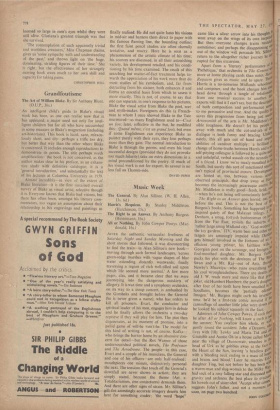Music Week The Right to an Answer. By Anthony Burgess.
(Heinemann, 16s.)
All or Nothing. By John Cowper Powys. (Mac- donald, 16s.)
AFTER the authentic vernacular liveliness of Saturday Night and Sunday Morning and the short stories that followed, it was disconcerting to find the train—in Alan Sillitoe's new book— moving through such formal landscapes, 'across green-sedge marshes with vague shapes of blue water extending distantly westwards; finally traversing a region of rich well-tilled soil upon which life seemed more normal.' A few more pages, alas, and it became clear that we were journeying into the dangerous outskirts of allegory. It is war-time and a symphony orchestra, on its way to a troop concert, is ambushed by the Gorsheks and brought before the General (he is never given a name), who has orders to kill all prisoners. Evart, the conductor and spiritual leader of his men, engages him in debate and he finally allows the orchestra a two-day reprieve if they will play for him. The plot then d:generates, at its moment of promise, into a pallid game of will-he won't-he. The model for this kind of writing is not, of course. Kafka-- who brings the horror home by an obsessive con- cern for detail—but the Rex Warner of those undernourished political novels, The Professor and The Aerodrome. The people—in this case, Evart and a couple of his musicians, the General and one of his officers—are only half-realised: mouthpieces one minute, distinctively personal the next. The tensions that touch off the General's downfall are never shown in action; they are simply stated, because the theme (Art v. Totalitarianism, one conjectures) demands them. And there are other signs of strain. Mr. Sillitoe's gift for arrestingly accurate imagery deserts him here for something cruder: 'the word "hope" came like a silver arrow into his thoughts,° went away on the wings of its own inept l But then everyone changes trains misfak,,,i sometimes; and perhaps the disappointing vw„ out of the window will persuade Mr. Sillitoe; return to the altogether richer journey he in rupted for this excursion. Apart from a 'literary' performance of `Pathetique,' that orchestra in The General more at home playing cards than notes. Ihir1°, Requiem gives us music and to spare. 11074 Harris is a no-nonsense Midlands schoolnia_r and composer, and the book charges him al7„, head down through a tangle of relationship from one musical success to another. experts will find it I can't say, but the descril of both composition and performance see to to me persuasive and true. And the quality' it( saves this progression from being just an' Arrowsinith of the arts is Mr. Middleton's Sit sible toughness. He doesn't let his people o away with much and the cut-and-jab of w'r dialogue is both funny and bracing. Unf°r1o, nately, this all gets out of hand and imPr01, abilities of candour multiply : a brilliant rtL change of home-truths between Harris and a '4_„, self-pitying colleague is followed by a quite' nt and unhelpful, verbal assault on the neurotic "loc of a friend. I know we're mealy-mouthed in South, but surely this sort of sanctioned snarnt' isn't typical of provincial ,71WlirS. Developrne are hinted at, too, between various 01er; observed principals, that drop away as Ha,,r; becomes the increasingly picaresque centre. P: Mr. Middleton is really good—fresh, brisk. sat —when he's not being self-consciously horrid dl The Right to an Answer goes horrid, too• sN'ir before the end. This is not the best of Burgess's books. Something has happened to inspired gaiety of that Malayan trilogy. .1' ‘c Denham, a smug, fortyish businessman 0011 ) from the Far East, revisits the suburbs CI, ip `rather large smug Midland city.' God-vvottelli,i the toy gardens,' ITV, warm beer and other ea' targets are amusingly impaled while .Denllao, gets himself involved in the fortunes of an Iir ) efficient young printer, his faithless Georgian poet on the scrounge, and Imogen' el foul-mouthed daughter. Mr. Burgess fur packs his plot with the denizens of The liha'h Swan and a Mr. Raj—out of Aziz. thr Newby's Muawiya—who ruins everything "Id his cool wrongheadedness. There are deaths 311), old J. W. reads more and more like that Pri5'joker, old Humbert Humbert: the poet's daughter, „ after four of her teeth have been smashed in 't' hoodlums, becomes the 'partially edenta,,t Imogen.' Mr. Burgess might curb his invenn;11., ness; he'd be a first-rate comic novelist if 1:j camouflage of another little joke were down "I he looked his subject squarely in the face. re Admirers of John Cowper Powys, if such lb' I be after All or Nothing, will know a curb is the answer. You swallow him whole, or gently round the accident. John o'Dreams. lives with Jilly Tewky and Maria Tid and Grumble and Auntie Oh in a house called rvit''ti, near the village of Dunnowair, smashes 10 t; head of Urk as he gobbles away at the facc the Heart of the Sun, leaving 'a headless with a bleeding neck ending in a mass of and brains and blood.' Later he marries U10) daughter Ting, but not before he has been WI a worm-man and slug-woman to the Milky WaY had suck of a rosy falling star and discussed WI,ti; e gravity and archness the best place to evacti3.1, his bowels out of sister-shot. 'Accept what comes' suggests John's father, and not a moment tt". soon, on page two hundred.
siAS JOHN COLE,—






































 Previous page
Previous page